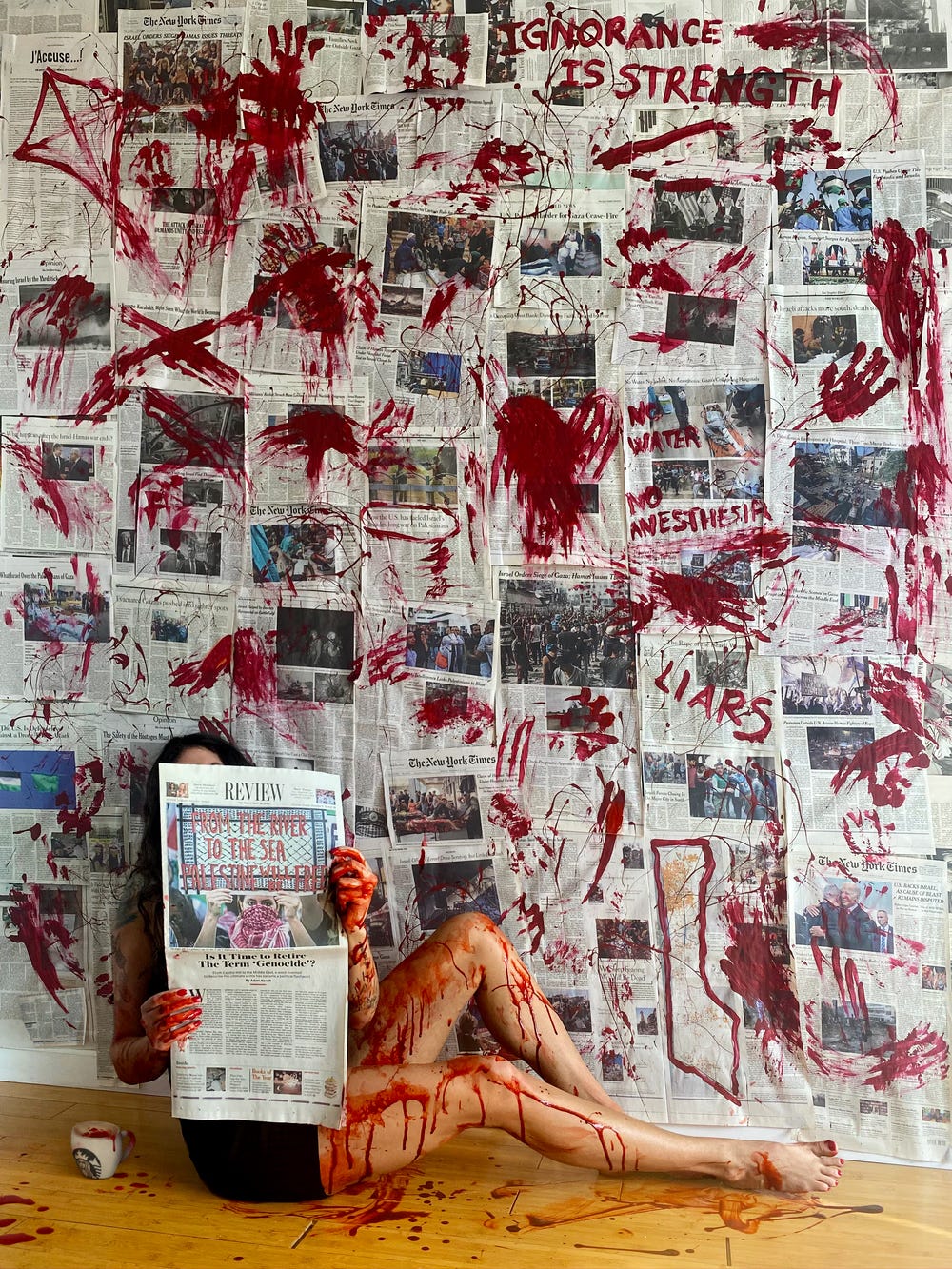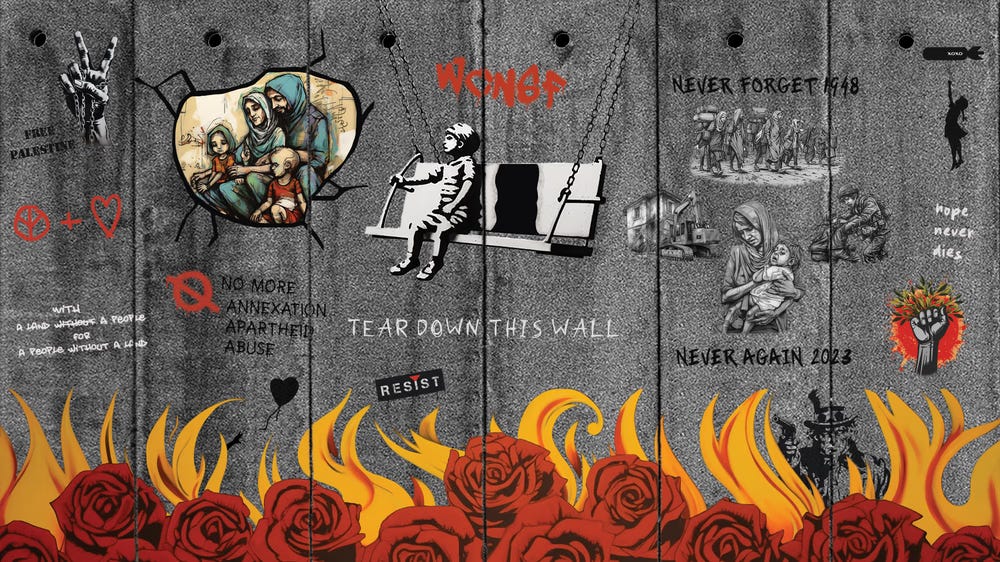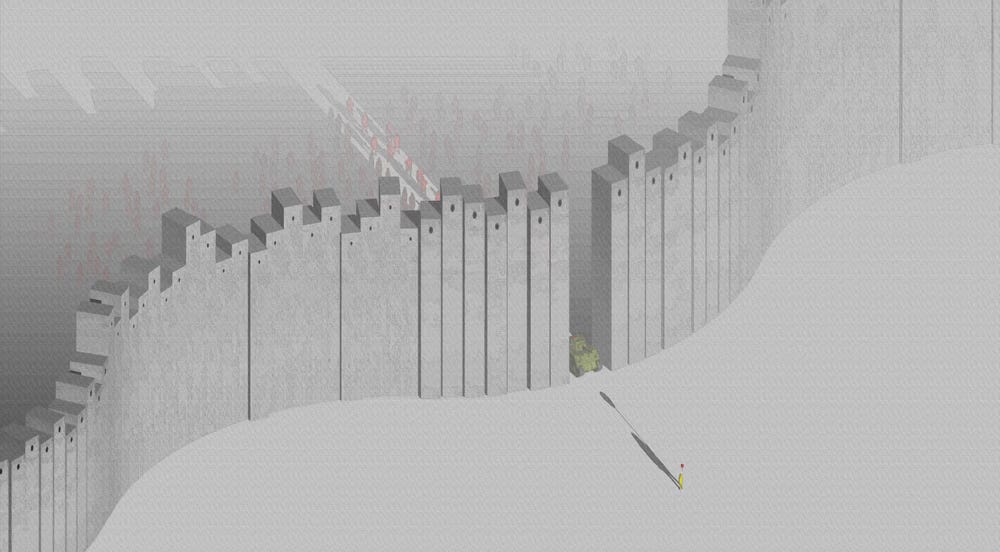Writing as Defiance
Narratives of Resistance and Palestinian Liberation
To write is to resist. For Palestinians, it means challenging the colonial knowledge system that claims the right to define who we are, where we belong, and whether we deserve to exist. In Palestine, writing becomes revolutionary defiance. Edward Said wrote that "the power to narrate, or to block other narratives from forming and emerging, is central to culture and imperialism." Writing reclaims what has been stolen—not only land but memory, identity, and humanity itself.
A settler-colonial project does not just steal land; it must get rid of the people who inhabit it, creating and imposing a false history that renders the colonized invisible or inferior. In Zionist rhetoric, the position is clear. The best outcome is to expel the Palestinians. If that cannot be achieved, the fallback is a rigged agreement that will make life so miserable they will eventually leave. This ideology does not believe in coexistence on the basis of equality.
This vision materialized in the Nakba—not as a past event but as an ongoing process. Israel did not stop at war crimes and ethnic cleansing in 1948—it continues today. Dispossession, displacement, and erasure persist through settlement expansion, land confiscation, siege, and the denial of return. Israeli colonization remains an active campaign to reduce the Palestinian presence, wrapped in biblical, moral, and security pretexts that present dispossession as virtue.
Palestinian resistance is the rational answer to this occupation, yet Western media criminalizes and distorts it, acting as both enabler and accomplice, bending language to shift blame from oppressor to oppressed. Liberation movements become "terrorist organizations." Occupation becomes a "territorial dispute." Dispossession is reframed as a "right to exist," ethnic cleansing as "voluntary migration," apartheid as "security measures." Even the bombing of civilians is sanitized as "precision airstrikes."
The West has long maintained Israel's image as both victim and moral superior. But the spectacle of overwhelming military force unleashed on Gaza has made that fiction harder to sustain. Images of mass displacement, targeted destruction, and deliberate starvation have begun to break through decades of propaganda, especially for younger generations. The old moral shield—the claim that Israel's violence is always reactive, always defensive—has started to crack under the weight of what the world can now see in real time.
These cracks matter. They create space for Palestinian voices to reach new audiences and contest the empire's story on their own terms. Writing seizes that space, dismantling the euphemisms of power with lived truths and replacing the colonizer's vocabulary with a record the oppressor cannot control.
Decolonization begins not with the land but in the mind. Colonization's most insidious conquest is not the territory it seizes but the ideologies it implants. Edward Said described how cultural hegemony convinces the colonized to internalize the narratives that justify their subjugation. Over decades, much of the Arab world has absorbed the colonizer's perspective—the belief that Arabs are incapable of acting without Western guidance, that legitimacy comes not from their own societies and values but from Western approval, that Palestinians, and by extension Arabs, must accept a subordinate place.
Hanan Ashrawi recalls her father's words: "Liberate yourself, and you liberate the land." In Palestine, as across the Arab world, the colonization of thought has targeted the symbols of identity. Arabic—through which we articulate our identity—is displaced by Western tongues sold as the sole keys to modernity. Palestinian art and literature are sidelined, our voices drowned out by imperial narratives that brand resistance as barbarism and submission as progress. This assault on culture erodes the confidence to speak, think, and act outside the colonizer's framework.
Writing resists the settler-colonial project's attempt to reduce the oppressed to faceless masses. Palestinian writing reclaims the power to name, define, and remember on our own terms. It produces knowledge from our lived reality, documenting what they try to erase while envisioning what they claim is impossible. And crucially, it tells the stories of real people—the grandmother holding her 1948 key, the olive farmer watching settlers uproot his trees, the Gazan doctor operating without anesthesia—transforming the abstract into the tangible.
Ghassan Kanafani, the Palestinian writer and revolutionary, embodied this principle. In his novels, short stories, essays, and political writings, he chronicled the sacrifices, aspirations, and struggles of a displaced people, revealing both resilience and vulnerability. Storytelling for Kanafani was never detached from the struggle it depicted; whether in literature or political analysis, each work was an act of resistance in itself. It was this union of art and struggle that led one obituary to describe him as "a commando who never fired a gun, whose weapon was a ball-point pen." His writing was a weapon of clarity, exposing lies and affirming the legitimacy of resistance. The pen and the sword were not opposites but complements, equally vital to liberation.
Today, that same weapon faces a new battlefield. Our story is met with algorithmic censorship, criminalized speech, and the smear of antisemitism for any criticism of Israel. Palestinian writers, journalists, and artists are banned from platforms, denied visas, and blacklisted. When our voices do break through, international media strips them of context and adopts the Occupation's narrative to challenge them.
Yet even the barriers of censorship, media distortion, and political repression are not impenetrable. The Palestinian story moves through channels the authorities cannot seal—citizen journalists in Gaza posting in real time despite platform suppression, diaspora communities organizing protests and boycotts across continents, reporters finding ways to publish what others suppress, and artists using murals, music, theater, and film to carry our struggle into streets, galleries, and screens worldwide. Writers and activists connect it to the struggles of Indigenous land defenders in the Americas, anti-apartheid veterans in South Africa, and movements in the Global South who recognize their own history in ours.
Our struggle is part of a shared fight against the machinery of empire, one that exposes how censorship and narrative control are tools of domination everywhere. In standing with Palestine, they stand for their own liberation, and in their resistance, we find the echo of our own.
“How large the revolution, how narrow the journey, how grand the idea, how small the state!” Mahmoud Darwish’s words are a reminder that the Palestinian cause has always been about people—about the right to return, to live with dignity, to exist without permission—and about freedom from oppression everywhere. They cut through the vanity of narrow nationalist ambitions, setting them against the universal ideals of liberation and justice. They measure the vastness of a struggle for freedom against the shrunken horizon of a bantustan reality—a vision reduced to a cage with a flag. The Palestinian idea is not the cramped borders of an Oslo map but the full breadth of a people's right to live free on their land. To accept less is to abandon the revolution that gave it life.
To write is to resist—not as metaphor, but as a daily act of liberation. Every word that rejects erasure and every sentence that refuses the Occupation's language keeps the horizon of freedom visible. Writing carries the memory they try to bury, affirms the humanity they try to deny, and preserves the vision they want us to forget.
As long as we write, we resist—and as long as we resist, the story of Palestine will remain ours to tell.




and we're here to spread it far and wide - great read. The essay made me think of two recent finds:
. epistemicide, while not in dictionaries gets close to capturing the act in words? First heard here, the native Americans know a thing or two about it: https://longnow.org/seminars/02024/feb/06/indigenous-sovereign-futures/
. in the art of war, eyal weisman seems to lay bare the same tool but in the context of the military, supporting the hunch/observations with evidence that the machine turns with extreme precision to perpetrate exactly what you describe. https://www.frieze.com/article/art-war
there are words to describe this crime, and evidence to expose it. We just need to be brave enough to keep spreading - inspired by the perpetrators' moto: never forgive, never forget.
excited to read more of your content.
This is a powerful and sobering reflection. Writing as resistance shows the courage to assert identity, memory, and humanity under immense oppression. It’s heartbreaking to see how narratives and lives are manipulated, and my thoughts are with all those living through this ongoing struggle. 💔